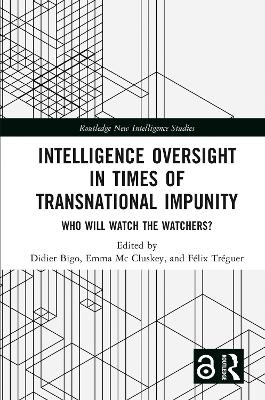
Intelligence Oversight in Times of Transnational Impunity
Routledge (Verlag)
978-1-032-40654-1 (ISBN)
Largely confined to the sub-field of intelligence studies, scholarly engagements with intelligence oversight have typically downplayed the violence carried out by secretive agencies. These studies have often served to justify weak oversight structures and promoted only marginal adaptations of policy frameworks in the wake of intelligence scandals. The essays gathered in this volume challenge the prevailing doxa in the academic field, adopting a critical lens to look at the workings of intelligence oversight in Europe and North America. Through chapters spanning across multiple disciplines – political sociology, history, and law – the book aims to recast intelligence oversight as acting in symbiosis with the legitimisation of the state’s secret violence and the enactment of impunity, showing how intelligence actors practically navigate the legal and political constraints created by oversight frameworks and practices, for instance by developing transnational networks of interdependence. The book also explores inventive legal steps and human rights mechanisms aimed at bridging some of the most serious gaps in existing frameworks, drawing inspiration from recent policy developments in the international struggle against torture.
This book will be of much interest to students of intelligence studies, sociology, security studies, and international relations.
The Open Access version of this book, available at www.taylorfrancis.com, has been made available under a Creative Commons Attribution-Non Commercial-No Derivatives 4.0 license.
Didier Bigo is a professor of International Political Sociology at Sciences-Po Paris-CERI, France, and a part-time professor at King’s College London, Department of War Studies. He is the author or editor of many books, including Data Politics (2019) and Extraordinary Rendition (2018), most recently. Emma Mc Cluskey is a lecturer in Criminology at the University of Westminster, London. She is the author of From Righteousness to Far Right; An Anthropological Rethinking of Critical Security Studies (2019) and co-editor of Security, Ethnography and Discourse (2022). Félix Tréguer is an associate researcher at the CNRS Center for Internet and Society and a former postdoctoral fellow for the GUARDINT project at CERI-Sciences Po. He is a founding member of La Quadrature du Net, an advocacy group dedicated to the defence of human rights in relation to digital technologies.
Introduction 1. From radical contention to deference: A sociogenesis of intelligence oversight in the United States (1967-1981) 2. Transformations of the transnational field of secret services: The Reasons for a systemic crisis of legitimacy? 3. The code of silence: Transnational autonomy and oversight of signals intelligence 4. From abuse to trust and back again: Intelligence scandals and the quest for oversight 5. An analysis of post-Snowden civil society accountability 6. Transversal intelligence oversight in the United States: Squaring the circle? 7. The anatomy of political impunity in New Zealand 8. Liberty, equality, and counter-terrorism in France 9. Intelligence oversight collaboration in Europe 10. Torture and security service mass surveillance
| Erscheinungsdatum | 05.12.2023 |
|---|---|
| Reihe/Serie | Routledge New Intelligence Studies |
| Zusatzinfo | 3 Tables, black and white |
| Verlagsort | London |
| Sprache | englisch |
| Maße | 156 x 234 mm |
| Gewicht | 860 g |
| Themenwelt | Geisteswissenschaften ► Psychologie ► Allgemeine Psychologie |
| Sozialwissenschaften ► Politik / Verwaltung ► Europäische / Internationale Politik | |
| ISBN-10 | 1-032-40654-2 / 1032406542 |
| ISBN-13 | 978-1-032-40654-1 / 9781032406541 |
| Zustand | Neuware |
| Haben Sie eine Frage zum Produkt? |
aus dem Bereich


